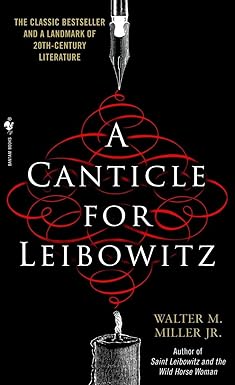
I was inspired to put this on my to-read list thanks to a couple books by Derek B. Miller, The Curse of Pietro Houdini and Radio Life. Both acknowledged a debt to A Canticle for Leibowitz as an inspiration.
Which makes sense. Like Radio Life, this book drops us into a dystopic Earth, with human civilization nearly wiped out, without much explanation. And, like Curse, the action centers around a monastery. (The author, Walter M. Miller, Jr., no relation to Derek, participated in the bombing of the Italian monastery at Monte Cassino in WWII.)
I've had this book (a 75¢ Bantam paperback) since 1968 or so. Guilty admission: I can't remember if I previously read it. I might have a dim recollection of a certain character who, um, wanders throughout the book, but that's about it. (I may be confusing him with a continuing character from Neal Stephenson novels, but—hey, is he the same guy?)
The novel stitches together and revises three novellas that Miller wrote for The Magazine of Fantasy and Science Fiction in the 1950s. It won the Hugo Award for best novel in 1961. The three sections are spaced centuries apart.
In the first, young Francis is on a desert vigil when (with the assistance of that wanderer) he discovers an ancient shelter containing lost technological knowledge, the "Memorabilia", saved from the anti-technological post-apocalypse jihad by "Saint" Leibowitz. Things don't work out well for him.
In the second part, hundreds of years later, the budding scientists and engineers of the day are analyzing the Memorabilia, making some crude progress toward generating electricity; it's a time of political intrigue as well.
And in the last part, another few centuries on, mankind has re-developed technology in full, with starships. And nukes. The monastery searches for some way to preserve the church in the face of another Armageddon.
My paperback's front cover quotes the Chicago Tribune review, which calls the book "terrifyingly grim". I see their point, but there's also some funny stuff, especially in the early going. But, on the whole, it's kind of a downer. A good, well-written downer, but still.
![[The Blogger and His Dog]](/ps/images/me_with_barney.jpg)



